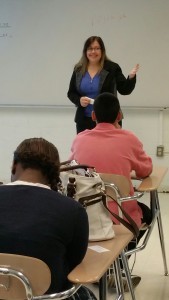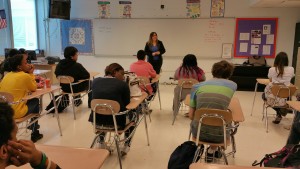Lombard: It’s Your Money, and You Are In Control Of It
NEW HAVEN – Do you remember walking nervously into a bank to open up your first savings or checking account, only to get swarmed by tellers or financial advisors who asked numerous personal questions and wanted you to sign papers you did not understand? Patricia Lombard does. And she sees it happen every day. “Be empowered! Don’t feel intimidated by banks and bank tellers,” the Webster Bank assistant manager told a group of Hillhouse JAG students on Wednesday, May 13.
Ms. Lombard addressed two classes of JAG students and imparted her knowledge in a number of areas, including opening your first savings and checking accounts, the advantage of direct deposit, debit cards vs. credit cards, service fees (primarily about convenience) and overdraft fees, and what a credit score is, how to build good credit, and why that is so important.
“Your credit score is your reputation on paper. It’s about paying your bills responsibly,” she said.
 Lombard informed students that late in their senior year, they will begin to receive their first credit card offers from banks like Discover, Chase, Capital One, and First Niagara. They will offer you an opening balance around $500 just for opening the card, even if you don’t have a job. The best way to start earning a good credit score is to make small purchases on the card and to be sure that you pay your bill on time and in full. To do that, students will need money in the bank.
Lombard informed students that late in their senior year, they will begin to receive their first credit card offers from banks like Discover, Chase, Capital One, and First Niagara. They will offer you an opening balance around $500 just for opening the card, even if you don’t have a job. The best way to start earning a good credit score is to make small purchases on the card and to be sure that you pay your bill on time and in full. To do that, students will need money in the bank.
Students can open a savings account once they are 16 years old. Checking accounts need to be opened as a joint account with a parent, guardian, or trusted adult, up until the age of 18. Lombard mentioned that students can begin to create their independence with photo identification (license or permit, passport, town hall photo, etc.). Because of the Patriot Act, bankers need to identify you, so you will need a form of identification, your social security number, and proof of residence to open a savings or checking account.
Finally, she encouraged everyone to check their bank and card statements every month and to be cognizant of their balances and how much they are spending.
“Nobody is going to take better care of your money than you are,” Lombard reminded students. “Don’t leave it up to anybody else.”

